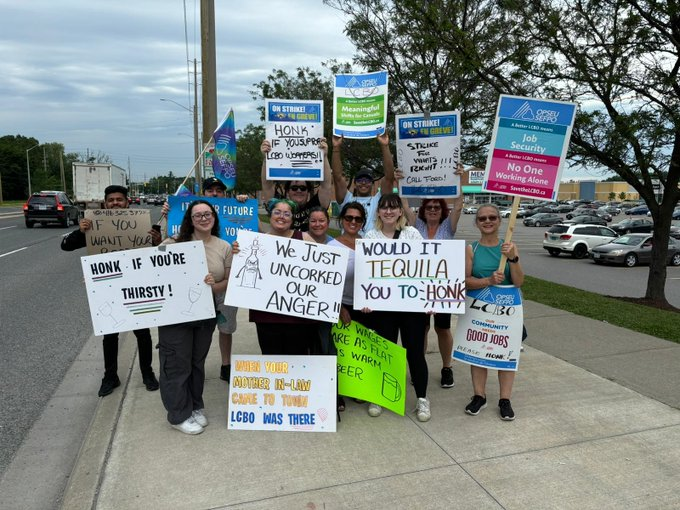As of 12:01 a.m. on July 5, over 9000 LCBO workers represented by the Ontario Public Service Employees Union (OPSEU) have gone on strike across the province. Workers voted 97% in favour of walking off the job to fight for increased wages, more full-time positions, and the protection of union jobs. This action marks the first strike in the history of Ontario’s primary alcohol retailer.
“Tonight, Ford’s dry summer begins”, says Colleen MacLeod, chair of OPSEU’s liquor board employees bargaining team. “Doug Ford just wants to make life better for his wealthy friends. That’s why he’s wasting upwards of a billion dollars of Ontario’s money to fast-track privatized alcohol sales and hand over more public revenues generated by the LCBO over to CEOs and big box grocery and convenience chains like Circle K and 7-11.”
“I think it’s absolutely ridiculous that Doug Ford paid out companies like Walmart, Costco, and Circle K, American based companies, to sell our liquor. It’s absolutely atrocious” said Erica, an LCBO employee, during an interview with The North Star. “We want to protect our jobs”.
“I am a casual employee myself and I don’t have benefits,” she adds. “I wear glasses, I don’t have dental or any access to private healthcare services and can’t afford to go do that on my own. I wouldn’t say I make a livable wage. I still live with my parents, and it’s difficult, you know? Everyone deserves to make a livable wage”.
The strike comes on the heels of the Progressive Conservative government’s announcement to deregulate the sale of alcohol, and allow for the sales of wine, beer, and cider in every grocery and convenience store in the province.
Furthermore, workers have been dealing with the outsourcing of full-time, unionized positions to non-unionized contractors. Outsourced jobs include those in printing, online order fulfillment, warehouse work, and data management.
OPSEU announced that all 680 LCBO stores in Ontario will close for 14 days. Should the strike continue after this 14-day period, OPSEU states that it will open 32 stores with limited hours, Friday through Sunday.

The threat of a strike moved the LCBO and Ontario Government to make preparations; one week prior to Canada Day, store hours were increased to opening as early as 9:30am and closing as late as 10:00pm to allow consumers to “stock up” prior to the long weekend and possible strike.
Another measure that LCBO has taken is to continue to provide online order fulfillment provided by non-unionized contractors, with free delivery for the duration of the strike.
“This fight isn’t just about one workplace or one employer”, states OPSEU’s press release. “This is a fight for our entire province and every public good we enjoy, be it health care, education, or infrastructure. Every year, the LCBO generates $2.5 billion in revenues, which help pay for these vital public services.”
Deregulation measures will therefore have the effect of reducing the state budget, without any clear replacement measures, while funding for many public services is declining: for instance, per-pupil funding in the education system has not kept up with inflation in recent years, with Ford decreasing effective per-pupil funding by nearly 10% since 2018, according to the Ontario Secondary School Teachers’ Federation.
Privatization and cuts in public spending have been common grievances in recent public sector strikes in Ontario. Prior to the LCBO workers going on strike, the Ford Government’s budget cuts and privatization bids in the healthcare sector spurred the Ontario Health Coalition, an umbrella organization of NGOs, union locals, and healthcare faculty, to march on Queens Park in May of this year.
